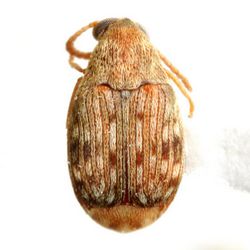Difference between revisions of "Acanthoscelides macrophthalmus (weed bioagent)"
From Pestinfo-Wiki
| (3 intermediate revisions by the same user not shown) | |||
| Line 1: | Line 1: | ||
| − | {{ | + | {{TaxLinks|LnkAcanthoscelidesWeedBioagents}} |
{{LiteratureDB1|{{PAGENAME}}|browse,hostsW}} | {{LiteratureDB1|{{PAGENAME}}|browse,hostsW}} | ||
| − | <font color="#008000">'''''Acanthoscelides macrophthalmus'' (weed bioagent)'''</font> (Schaeffer, 1907) | + | [[File:Acanthoscelides macrophthalmus BugGuide.jpg|250px|thumb|''Acanthoscelides macrophthalmus'' (click on image to enlarge it)<br/>Author(s): Mike Quinn<br/>Source: [http://bugguide.net/node/view/720932 BugGuide]]] |
| − | + | <font color="#008000">'''''Acanthoscelides macrophthalmus'' (weed bioagent)'''</font> (Schaeffer, 1907) | |
| + | |||
| + | The beetle attacks the seeds of ''[[Leucaena leucocephala (weed)|Leucaena leucocephala]]'' and is native to Central America. It is now widespread in Asia, Africa and Australia where it was either inadvertently introduced through contaminated ''Leucaena'' seeds or introduced deliberately as a biological control agent (e.g. in South Africa in 1999). The female oviposits on seed pods and on loose leucaena seeds. The hatching larvae burrow into the seeds, develop and pupate in them. It is also considered a pest in some areas where ''Leucaena'' is regarded as useful and because of non-target effects, see [[Acanthoscelides macrophthalmus|''Acanthoscelides macrophthalmus'' (pest)]]. | ||
[[Category:Acanthoscelides (genus - weed bioagents)]] | [[Category:Acanthoscelides (genus - weed bioagents)]] | ||
Latest revision as of 18:20, 1 August 2017
| Literature database |
|---|
| 12 articles sorted by: |
| • year (recent ones first) |
| • research topics |
| • countries/regions |
| • list of weed species |
Acanthoscelides macrophthalmus (weed bioagent) (Schaeffer, 1907)
The beetle attacks the seeds of Leucaena leucocephala and is native to Central America. It is now widespread in Asia, Africa and Australia where it was either inadvertently introduced through contaminated Leucaena seeds or introduced deliberately as a biological control agent (e.g. in South Africa in 1999). The female oviposits on seed pods and on loose leucaena seeds. The hatching larvae burrow into the seeds, develop and pupate in them. It is also considered a pest in some areas where Leucaena is regarded as useful and because of non-target effects, see Acanthoscelides macrophthalmus (pest).
